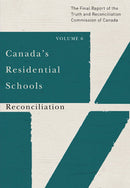Description
Canada's Residential Schools: Reconciliation, Volume 6 establishes guiding principles and a framework for advancing reconciliation in Canadian society. This final volume of The Final Report of the Truth and Reconciliation Commission of Canada (TRC) identifies the challenges that must be overcome if reconciliation is to flourish in the twenty-first century and highlights the critical role that Aboriginal peoples' cultures, histories, and laws must play in the reconciliation process. The volume demonstrates that although apologies from Canada and the churches were important symbolic events, reconciliation also requires concrete measures to repair the damaged relationship between Aboriginal peoples and the Crown and to establish respectful relationships between Aboriginal and non-Aboriginal peoples. Based on these findings, the Commission makes specific calls to action that, when implemented, will ensure that reconciliation has a strong foundation in Canada, moving into the future. For many Aboriginal people, reconciliation is foremost about healing families and communities, and revitalizing Indigenous cultures, languages, spirituality, laws, and governance systems. For governments, building a respectful relationship involves dismantling a centuries-old political and bureaucratic culture in which, all too often, policies and programs are still based on failed notions of assimilation. For churches, demonstrating long-term commitment to reconciliation requires atoning for harmful actions in the residential schools, respecting Indigenous spirituality, and supporting Indigenous peoples’ struggles for justice and equity. Schools must teach Canadian history in ways that foster mutual respect, empathy, and engagement. All Canadian children and youth deserve to know what happened in the residential schools and to appreciate the rich history and collective knowledge of Indigenous peoples. This volume also emphasizes the important role of public memory in the reconciliation process, as well as the role of Canadian society, including the corporate and non-profit sectors, the media, and the sports community in reconciliation. The Commission urges Canada to adopt the United Nations Declaration on the Rights of Indigenous Peoples as a framework for reconciliation. While Aboriginal peoples are victims of violence and discrimination, they are also holders of Treaty, Aboriginal, and human rights and have a critical role to play in reconciliation. All Canadians must understand how traditional First Nations, Inuit, and Métis approaches to resolving conflict, repairing harm, and restoring relationships can inform the reconciliation process. The TRC’s calls to action identify the concrete steps that must be taken to ensure that our children and grandchildren can live together in dignity, peace, and prosperity on these lands we now share.


